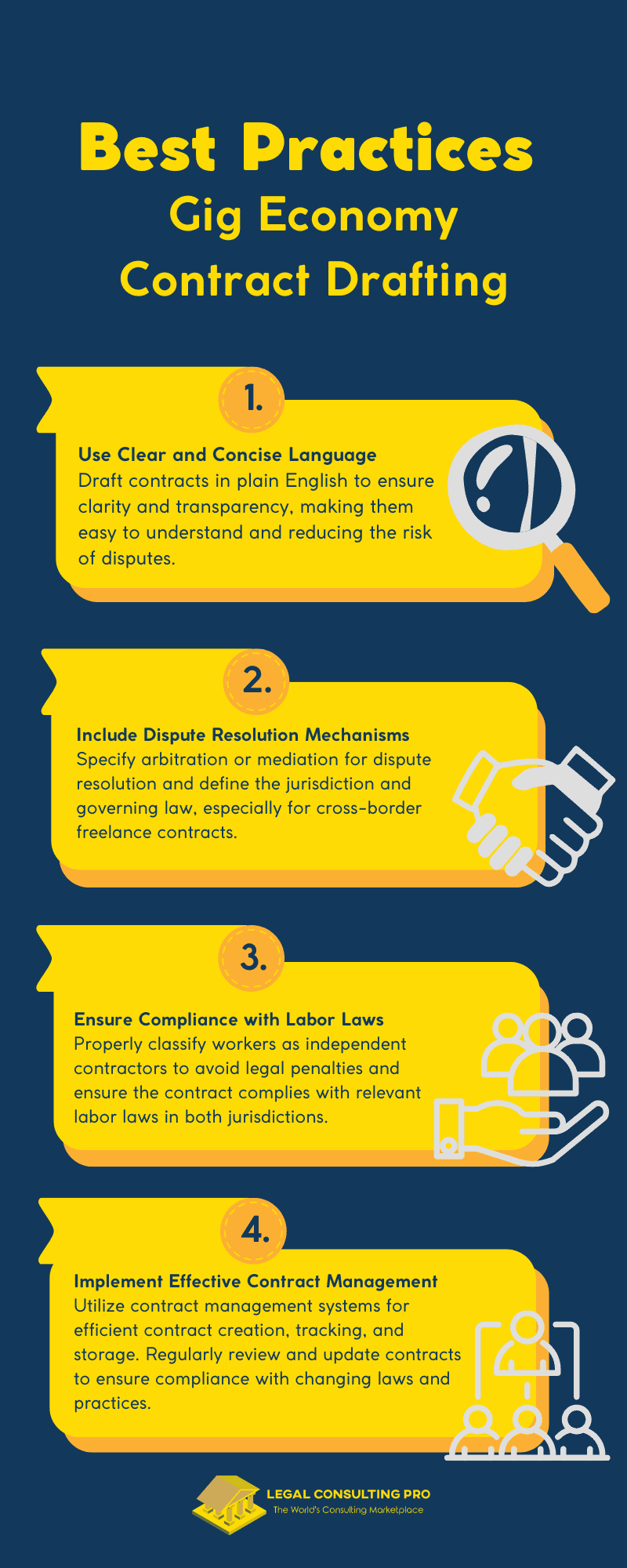The gig economy has dramatically transformed the traditional employment landscape, offering flexibility and opportunities for both freelancers and businesses. However, the unique nature of gig work necessitates a distinct approach to contract drafting and management. Effective contracts are essential to protect the interests of both freelancers and businesses, ensuring clarity, compliance, and mutual benefit. This article delves into the intricacies of gig economy contract drafting, highlighting best practices and key considerations for safeguarding all parties involved.
Understanding the Gig Economy
The gig economy encompasses a wide range of short-term, flexible jobs, often facilitated through digital platforms. Freelancers, or gig workers, take on assignments or projects, providing services ranging from ride-sharing and food delivery to graphic design and software development. Unlike traditional employees, freelancers operate as independent contractors, which significantly impacts the contractual relationship between them and the businesses they serve.
Key Components of Gig Economy Contract Drafting
-
Scope of Work
- Clear Definition of Tasks: A well-drafted contract should precisely define the tasks and deliverables expected from the freelancer. This includes detailed descriptions of the services to be provided, milestones, deadlines, and any specific requirements or standards.
- Project Scope and Limitations: It’s essential to outline the project’s scope and limitations to prevent scope creep, where additional tasks are expected without additional compensation. Clearly state what is included and excluded in the service agreement.
-
Payment Terms
- Compensation Structure: Specify the payment structure, whether it is hourly, per project, or milestone-based. Include details on rates, invoicing procedures, and payment schedules.
- Expenses and Reimbursements: Address any potential expenses the freelancer might incur and whether these will be reimbursed by the business. Clearly outline the process for submitting and approving expense claims.
-
Intellectual Property Rights
- Ownership of Work: Clearly define the ownership of the work produced. In many cases, businesses will want to retain full rights to the deliverables, while freelancers might retain rights to their pre-existing intellectual property.
- Licensing and Usage Rights: If the freelancer retains any rights, specify the licensing terms and usage rights granted to the business. This ensures both parties understand the extent of use allowed.
-
Confidentiality and Non-Disclosure
- Protection of Sensitive Information: Include confidentiality clauses to protect proprietary information, trade secrets, and any confidential data shared during the engagement.
- Duration of Confidentiality Obligations: Specify how long the confidentiality obligations will remain in effect, both during and after the contract term.
-
Termination and Renewal
- Termination Clauses: Define the conditions under which either party can terminate the contract, including notice periods and any penalties for early termination.
- Renewal and Extensions: Outline the process for contract renewal or extension, if applicable. Specify any changes to terms that would apply in renewed contracts.
Best Practices for Gig Economy Contract Drafting
-
Use Clear and Concise Language
Avoid Legal Jargon: Contract drafting should be easy to understand for all parties involved. Avoid overly complex legal language that could lead to misunderstandings.
Plain English: Use plain English to ensure clarity and transparency. Clear communication helps build trust and reduces the risk of disputes.
-
Include Dispute Resolution Mechanisms
Arbitration and Mediation: Specify dispute resolution mechanisms such as arbitration or mediation to resolve conflicts without resorting to litigation.
Jurisdiction and Governing Law: Define the jurisdiction and governing law that will apply to the contract. This is particularly important for cross-border freelance engagements.
-
Ensure Compliance with Labor Laws
Classification of Workers: Properly classify workers as independent contractors rather than employees to avoid legal complications. Misclassification can lead to significant legal and financial penalties.
Adherence to Local Regulations: Ensure the contract complies with relevant labor laws and regulations in the freelancer’s and business’s jurisdictions.
-
Implement Effective Contract Management
Contract Management Systems: Utilize contract management systems to streamline the creation, tracking, and storage of contracts. These systems enhance efficiency and ensure important contract milestones are not overlooked.
Regular Reviews and Updates: Regularly review and update contracts to reflect changes in laws, regulations, and business practices. This proactive approach helps maintain compliance and relevance.

Protecting Freelancers in the Gig Economy
-
Fair Compensation
Transparent Payment Terms: Freelancers should advocate for transparent payment terms that ensure timely and fair compensation for their work. Contract drafting should detail payment schedules, methods, and any penalties for late payments.
Deposit or Upfront Payment: Where possible, freelancers should request a deposit or upfront payment to secure their commitment and reduce the risk of non-payment.
-
Clear Work Expectations
Detailed Scope of Work: Freelancers should ensure the contract management includes a detailed scope of work to avoid misunderstandings about the services to be provided.
Change Orders: Include provisions for handling changes or additional work requests, specifying how these will be documented and compensated.
-
Protection of Rights
Intellectual Property Clauses: Freelancers should pay close attention to intellectual property clauses to ensure their rights are protected. They should seek to retain ownership of their pre-existing IP and negotiate fair terms for the transfer of new IP created during the engagement.
Confidentiality Agreements: Ensure confidentiality agreements protect the freelancer’s proprietary methods and information shared with the business.
Protecting Businesses in the Gig Economy
-
Ensuring Quality and Timeliness
- Performance Metrics: Businesses should include performance metrics and quality standards in the contract management to ensure the freelancer meets expectations.
- Milestones and Deadlines: Specify milestones and deadlines to track progress and ensure timely completion of the project.
-
Legal and Regulatory Compliance
- Proper Classification: Businesses must ensure freelancers are correctly classified as independent contractors to avoid legal repercussions. This includes not dictating work hours or integrating freelancers too closely into the business’s operations.
- Compliance with Data Protection Laws: When sharing sensitive information, businesses should ensure contracts include clauses that comply with data protection laws, such as GDPR or CCPA.
-
Risk Mitigation
- Indemnity Clauses: Include indemnity clauses to protect against potential legal claims arising from the freelancer’s work.
- Insurance Requirements: Specify any necessary insurance requirements, such as professional liability insurance, to cover potential risks associated with the freelancer’s services.
The Future of Gig Economy Contracting
-
Technological Advancements
- Digital Contracts and E-Signatures: The use of digital contract drafting and e-signatures streamlines the contract drafting and management process, making it more efficient and accessible.
- Blockchain and Smart Contracts: Emerging technologies like blockchain and smart contracts offer secure and transparent ways to manage gig economy contract drafting, ensuring automatic execution of contract management terms and reducing the need for intermediaries.
-
Evolving Legal Landscape
- Regulatory Changes: As the gig economy continues to grow, governments are increasingly scrutinizing the classification of gig workers. Legal professionals must stay abreast of regulatory changes to ensure compliance.
- Global Considerations: The global nature of the gig economy means contracts must consider cross-border legal and tax implications. Understanding international labor laws and tax treaties is essential for both freelancers and businesses.
-
Enhanced Protections for Freelancers
- Advocacy and Legislation: Increased advocacy for gig workers’ rights is likely to result in new legislation aimed at providing greater protections for freelancers. This could include minimum wage standards, access to benefits, and collective bargaining rights.
- Standardized Contract Drafting: Industry-wide adoption of standardized contract templates could help streamline the contracting process and ensure fair terms for all parties.
Conclusion
The gig economy presents unique opportunities and challenges for both freelancers and businesses. Effective contract drafting and management are critical to navigating this dynamic landscape, ensuring clarity, compliance, and mutual benefit. By incorporating best practices and staying informed about evolving legal requirements, both freelancers and businesses can protect their interests and foster successful, sustainable working relationships. As the gig economy continues to evolve, so too must the approaches to contract drafting and management, leveraging technological advancements and adapting to changing regulatory environments.
Similar Blogs:
Smart Contract Drafting: Crypto Craze: Legal Framework and Blockchain Transactions







































